List of presidents of the United States by previous experience
Although many paths may lead to the presidency of the United States, the most common job experience, occupation or profession of U.S. presidents has been that of a lawyer.[1] This sortable table enumerates all holders of that office, along with major elective or appointive offices or periods of military service prior to election to the presidency. The column immediately to the right of the presidents' names shows the position or office held just before the presidency. The next column to the right lists the next previous position held, and so on. Note that the total number of previous positions held by an individual may exceed four; the number of columns was limited to what would fit within the page width. The last two columns on the right list the home state (at the time of election to the presidency) and primary occupation of each future president, prior to beginning a political career.
By the numbers
Of the 45[a] different people who have been or are currently serving as president:
Political Experience
- 20 presidents previously served as governors; 17 presidents were state governors;[2] 9 were governors immediately before election as presidents. Two, William Henry Harrison and William Howard Taft, served as territorial governors. One, Andrew Jackson, served as a military governor of a territory (Florida) before it became a state. Andrew Johnson served in Tennessee during the Civil War
- 18 presidents previously served as U.S. representatives; 6 of 18 held this office prior to the four 'previous positions' shown in this table. Only one – James A. Garfield – was a representative immediately before election as president. Only Garfield and Abraham Lincoln had served in no higher office than representative when elected president. Only John Quincy Adams served as a U.S. representative after being president. Additionally, after being president, John Tyler served in the Provisional Confederate Congress and was later elected to the Confederate House of Representatives, but he died before taking his seat.[3]
- 17 presidents previously served as U.S. senators; only 3 immediately before election as president. Only one president, Andrew Johnson, served as a U.S. senator after his presidency
- 15 presidents previously served as vice presidents. All except Richard Nixon and Joe Biden were vice presidents immediately before becoming president; 9 of the 15 succeeded to the presidency upon the death or (in one case) resignation of the elected president; 5 of those 9 were not later elected
- 8 presidents previously served as Cabinet secretaries; 6 as secretary of state; 5 of the 8 served immediately before election as president
- 7 presidents had previous experience in foreign service.[b]
- 5 presidents had never been elected to public office before becoming president: Zachary Taylor, Ulysses S. Grant, Herbert Hoover, Dwight D. Eisenhower, and Donald Trump. Most of these had, however, been appointed to several prominent offices. Hoover's contributions toward the Treaty of Versailles preceded his appointment as United States Secretary of Commerce. Taylor, Grant, and Eisenhower led U.S. forces to victory in the Mexican–American War, American Civil War, and World War II, respectively – each occupying the highest-ranking command post of their time. Trump is the group's sole exception, having never held any public office nor any military position
- 2 presidents served as party leaders of the House of Representatives, James A. Garfield and Gerald Ford
- 1 president served as speaker of the House of Representatives, James K. Polk
- 1 president served as president pro tempore of the United States Senate, John Tyler
- 1 president served as party leader of the United States Senate, Lyndon B. Johnson
- 1 president served as president of the United States for two non-consecutive terms, Grover Cleveland
Military Experience
- 32 presidents had previous military experience
- 9 were generals in the US Army.[c]
- 1 president had neither prior government nor military experience before becoming president, Donald Trump
Other Experiences
- 27 presidents were previously lawyers
- 9 presidents were out of office (for at least one year) immediately before election as president.
- 5 presidents taught at a university: James A. Garfield, William Howard Taft, Woodrow Wilson, Bill Clinton, and Barack Obama.
- 1 president served as an ordained minister, serving as a pastor in the Disciples of Christ (Christian) Church, James A. Garfield.[4][5]
- 1 president had a PhD, Woodrow Wilson.
List
| President | Previous 1 | Previous 2 | Previous 3 | Previous 4 | Occupation | State[d] | ||
|---|---|---|---|---|---|---|---|---|
| 1 |  |
George Washington | Out of office[e] | Constitutional Convention[f] | Out of office | Military[g] | Planter, land surveyor | Virginia |
| 2 | 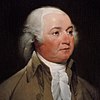 |
John Adams | Vice President | Foreign service[h] | Continental Congress | State legislator[i] | Lawyer, farmer | Massachusetts |
| 3 |  |
Thomas Jefferson | Vice President | Secretary of State | Foreign service[h] | Congressman | Planter, lawyer, land surveyor, architect | Virginia |
| 4 |  |
James Madison | Secretary of State | U.S. representative | Constitutional Convention | State legislator[i] | Planter | Virginia |
| 5 |  |
James Monroe | Secretary of State | Foreign service[h] | State governor | U.S. senator | Planter, lawyer | Virginia |
| 6 |  |
John Quincy Adams | Secretary of State | Foreign service[h] | U.S. senator | State legislator[i] | Lawyer | Massachusetts |
| 7 | 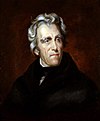 |
Andrew Jackson | Out of office[e] | U.S. senator | Military | U.S. senator | Lawyer, military officer | Tennessee |
| 8 |  |
Martin Van Buren | Vice President | Secretary of State | State governor[j] | U.S. senator | Lawyer | New York |
| 9 | 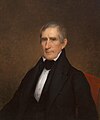 |
William Henry Harrison | Out of office[e] | Foreign service[h] | U.S. senator / U.S. representative | Territorial governor | Military | Ohio |
| 10 | 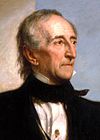 |
John Tyler | Vice President[k] | U.S. senator | State governor | U.S. representative | Lawyer | Virginia |
| 11 | 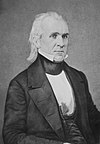 |
James K. Polk | Out of office[e] | State governor | Speaker of the House | U.S. representative | Lawyer, planter | Tennessee |
| 12 |  |
Zachary Taylor | Military | — | — | — | Military | Kentucky |
| 13 |  |
Millard Fillmore | Vice President[l] | State office | Out of office[e] | U.S. representative | Lawyer | New York |
| 14 |  |
Franklin Pierce | Out of office[e] | Military | U.S. senator | U.S. representative | Lawyer | New Hampshire |
| 15 | 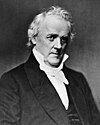 |
James Buchanan | Foreign service[h] | Out of office[e] | Secretary of State | U.S. senator | Lawyer | Pennsylvania |
| 16 | 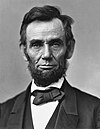 |
Abraham Lincoln | Out of office[e] | U.S. representative | State legislator[i] | Military | Lawyer, land surveyor | Illinois[m] |
| 17 |  |
Andrew Johnson | Vice President[n] | Military governor[o] | U.S. senator | State governor | Tailor | Tennessee |
| 18 |  |
Ulysses S. Grant | Military | — | — | — | Military | Illinois[p] |
| 19 | 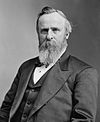 |
Rutherford B. Hayes | State governor | Out of office[e] | State governor | U.S. representative | Lawyer | Ohio |
| 20 |  |
James A. Garfield | U.S. representative | Military | State legislator[i] | — | Ordained minister, lawyer, teacher | Ohio |
| 21 |  |
Chester A. Arthur | Vice President[q] | Out of office[e] | Federal office[r] | Out of office | Lawyer, teacher, tariff collector | New York |
| 22 |  |
Grover Cleveland | State governor | Local office[s] | — | — | Lawyer | New York |
| 23 | 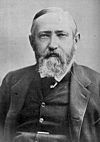 |
Benjamin Harrison | Out of office[e] | U.S. senator | Out of office | Military | Court reporter | Indiana |
| 24 |  |
Grover Cleveland | Out of office[e] | President of the U.S. | State governor | Local office[s] | Lawyer | New York |
| 25 |  |
William McKinley | State governor | U.S. representative | Military | — | Lawyer | Ohio |
| 26 | 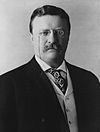 |
Theodore Roosevelt | Vice President[t] | State governor | Military | Federal office[r][u] | Historian, public servant, naturalist, military officer, policeman, rancher | New York |
| 27 |  |
William Howard Taft | Secretary of War | Territorial governor[v] | Judicial[w] | Federal office[r][x] | Lawyer, dean | Ohio |
| 28 | 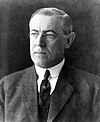 |
Woodrow Wilson | State governor | — | — | — | Academic[y] | New Jersey |
| 29 | 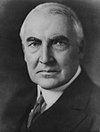 |
Warren G. Harding | U.S. senator | Out of office[e] | State legislator[i] | — | Journalist, publisher | Ohio |
| 30 |  |
Calvin Coolidge | Vice President[z] | State governor | State office | State legislator[i] | Lawyer | Massachusetts[aa] |
| 31 | 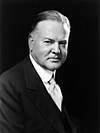 |
Herbert Hoover | Secretary of Commerce | Out of office[e][ab] | Federal office[r][ac] | — | Businessman, mining engineer | California |
| 32 | 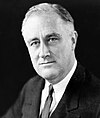 |
Franklin D. Roosevelt | State governor | Out of office[e] | Federal office[r][u] | State legislator[i] | Lawyer | New York |
| 33 | 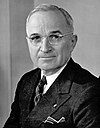 |
Harry S. Truman | Vice President[ad] | U.S. senator | County commissioner (County court) | Military | Farmer | Missouri |
| 34 | 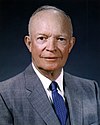 |
Dwight D. Eisenhower | Military | — | — | — | Military officer, President of Columbia University | Kansas |
| 35 | 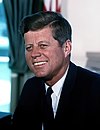 |
John F. Kennedy | U.S. senator | U.S. representative | Military | — | Journalist, military officer | Massachusetts |
| 36 |  |
Lyndon B. Johnson | Vice President[ae] | U.S. senator | U.S. representative | Federal office[r][af] | Teacher, military officer, rancher | Texas |
| 37 | 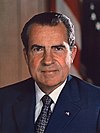 |
Richard Nixon | Out of office[e] | Vice President | U.S. senator | U.S. representative | Lawyer, naval officer | California |
| 38 |  |
Gerald Ford | Vice President[ag] | U.S. representative | Military | — | Lawyer, naval officer | Michigan[ah] |
| 39 |  |
Jimmy Carter | Out of office[e] | State governor | State legislator[i] | Military | Farmer, naval officer | Georgia |
| 40 |  |
Ronald Reagan | Out of office[e] | State governor | — | Military | Actor, Screen Actors Guild president |
California[ai] |
| 41 | 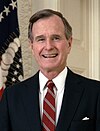 |
George H. W. Bush | Vice President | Out of office[e] | Federal office[r][aj] | Foreign service[h] | Businessman, naval aviator | Texas[ak] |
| 42 |  |
Bill Clinton | State governor | State attorney general | — | — | Lawyer, law professor at the University of Arkansas | Arkansas |
| 43 |  |
George W. Bush | State governor | Out of office[e][8] | Military[9] | — | Businessman, Air National Guard pilot | Texas |
| 44 |  |
Barack Obama | U.S. senator | State legislator[i] | — | — | Lawyer, law professor at the University of Chicago[al] | Illinois[am] |
| 45 | 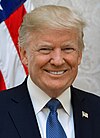 |
Donald Trump | — | — | — | — | Businessman, real estate developer, reality television personality | New York[an] |
| 46 | 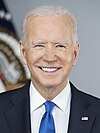 |
Joe Biden | Out of office[e] | Vice President | U.S. senator | Local office[s] | Lawyer | Delaware |
See also
Notes
- ^ There have been 46 presidencies (including the current president, Joe Biden), but Grover Cleveland was elected to two nonconsecutive terms, and as such is considered the 22nd and 24th president
- ^ Martin van Buren's brief foreign service is not counted since, although he was appointed Ambassador to the United Kingdom, the appointment was rejected by the U.S. Senate
- ^ George Washington was commanding general of the Continental Army, the pre-independence equivalent of the US Army. The 9 US Army generals were Jackson, W. H. Harrison, Taylor, Pierce, Grant, Hayes, Garfield, B. Harrison and Eisenhower. Others with military experience were Monroe, McKinley, T. Roosevelt, Truman, Kennedy, L. B. Johnson, Nixon, Carter, Ford, Reagan, G. H. W. Bush, G. W. Bush.
- ^ "State" refers to the state generally considered "home", not necessarily the state where the president was born
- ^ a b c d e f g h i j k l m n o p q r s t u v This designation is used whenever the subject was out of public office for more than one year
- ^ Washington was first chosen by the Virginia State Legislature to be a delegate to the Constitutional Convention. Then he was elected by the delegates to be president of the convention.
- ^ Commander-in-chief of the Continental Army during the American Revolutionary War
- ^ a b c d e f g This is a general designation for any appointive position representing the United States to a foreign government
- ^ a b c d e f g h i j This is a general designation for any elected state legislator
- ^ Van Buren served just over two months of his term as governor of New York before President Jackson appointed him Secretary of State
- ^ Tyler succeeded President Harrison, who died in office. He was not elected.
- ^ Fillmore succeeded President Taylor, who died in office. He was not elected.
- ^ Lincoln was born in Kentucky, but moved to Indiana, then Illinois at an early age
- ^ Johnson succeeded President Lincoln, who was assassinated. He was not elected.
- ^ President Lincoln appointed Johnson military governor of Tennessee during the Civil War
- ^ Grant was born and raised in Ohio. He rose to prominence as a Civil War general from Illinois and Illinois was his residence for his political career.[6][7]
- ^ Arthur succeeded President Garfield, who was assassinated. He was not elected.
- ^ a b c d e f g This is a general designation for appointive domestic Federal offices below cabinet level
- ^ a b c This is a general designation for local elective offices
- ^ Roosevelt succeeded President McKinley, who was assassinated. He was elected to a full term in 1904, chose not to run again in 1908, and ran unsuccessfully in 1912.
- ^ a b Assistant Secretary of the Navy
- ^ President McKinley appointed Taft governor-General of the Philippines
- ^ United States Court of Appeals for the Sixth Circuit
- ^ Solicitor General of the United States
- ^ Wilson served as president of Princeton University from 1902 to 1910
- ^ Coolidge succeeded President Harding, who died in office. He was elected to a full term in 1924, chose not to run again in 1928.
- ^ Born and raised in Vermont, Coolidge permanently moved to Massachusetts to attend college.
- ^ Following World War I, Hoover was involved with several humanitarian organizations.
- ^ Director of United States Food Administration
- ^ Truman succeeded President Roosevelt, who died in office. He was elected to a full term in 1948, chose not to run again in 1952.
- ^ Johnson succeeded President Kennedy, who was assassinated. He was elected to a full term in 1964, chose not to run again in 1968.
- ^ head of the National Youth Administration in Texas
- ^ Ford succeeded President Nixon, who resigned. He lost election in 1976. Previously, Ford was appointed vice president after Spiro Agnew resigned. Currently, only president not to have been elected to the executive branch.
- ^ Ford was born in Nebraska, but moved to Michigan at an early age
- ^ Reagan was born, raised and educated in Illinois; he moved permanently to California after graduation from college.
- ^ Director of the Central Intelligence Agency
- ^ Bush was born in Massachusetts, and raised in Connecticut, but moved to Texas after graduation from college.
- ^ Obama taught constitutional law at the University of Chicago Law School from 1992 to 2004
- ^ Obama was born in Hawaii and mostly raised there. His career was based in Illinois.
- ^ Trump, who was born in New York, ran for office in 2016 from there, but moved his official residence to Mar-a-Lago in Florida during his term.
References
- ^ International Law, US Power: The United States' Quest for Legal Security, p 10, Shirley V. Scott - 2012
- ^ Christensen, Tricia (January 5, 2023). "How Many United States Presidents Were Governors First?" www.unitedstatesnow.org. Retrieved January 13, 2023.
- ^ Journal of the Congress of the Confederate States of America, 1861–1865 Volume 1. U.S. Government Printing Office. 1904. pp. 303, 658.
- ^ The Preacher President http://punditwire.com/2012/03/03/the-preacher-president/
- ^ The Singular Humility of America's Only Ordained President https://www.christianitytoday.com/pastors/2016/april-web-exclusives/singular-humility-of-americas-only-ordained-president.html
- ^ "The Congressional Globe". Library of Congress. 1868. p. 1063.
- ^ McFeely, William S. (1981). Grant: A Biography. Norton. pp. 232–233. ISBN 0-393-01372-3.
- ^ P.O. Box 400406. "George W. Bush: Life Before the Presidency—Miller Center". Millercenter.org. Retrieved 2016-12-27.
{{cite web}}: CS1 maint: numeric names: authors list (link) - ^ York, Byron. "Byron York on George W. Bush & National Guard on National Review Online". Archived from the original on 2008-08-30. Retrieved 2016-12-27.
{{cite web}}: CS1 maint: bot: original URL status unknown (link)
